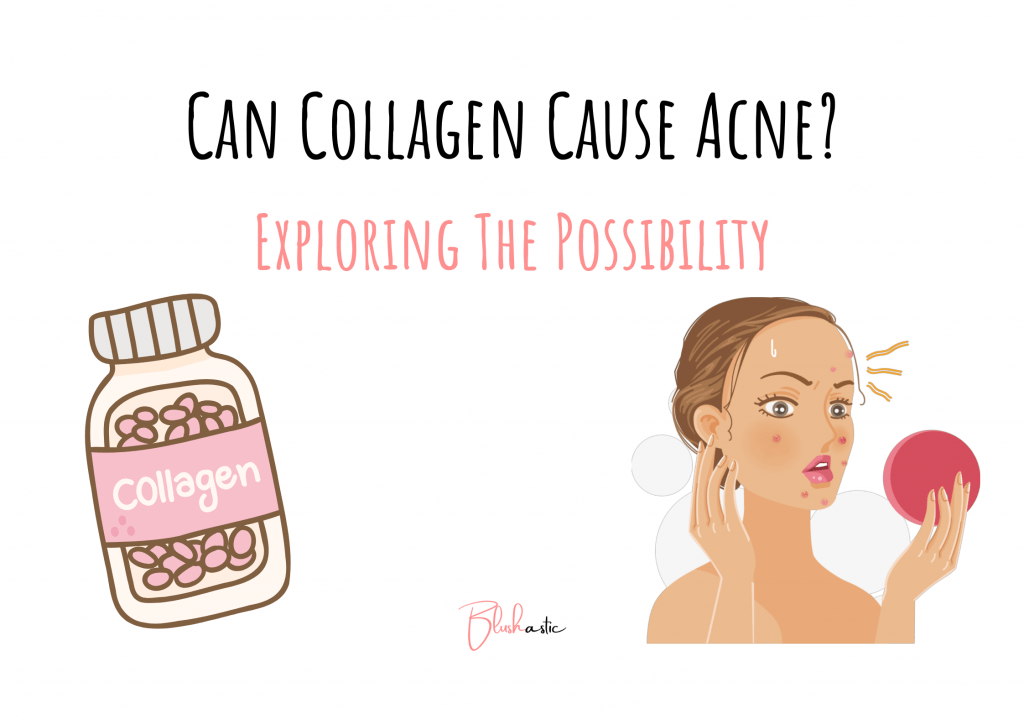Beauty and wellness enthusiasts have begun increasingly using collagen supplements to benefit their skin, bones, hair, and overall health. However, many fall victim to marketing ploys and fail to investigate this component thoroughly. With so many products enticing us with lofty claims, we need to remember that it is critical to consider their functions, benefits, and potential side effects before incorporating them into our diet.

One of the most frequently asked questions about the potential side effects of collagen supplements is, “Can Collagen Cause Acne?” This article intends to look in depth at collagen and acne and the relationship between the two. So, let’s get started.
Contents
Can Collagen Cause Acne? | Are They Related?
Before delving into the question,” Can collagen cause acne breakouts?” it is necessary to understand each of them better individually to determine whether they are related.
What is Collagen?
Collagen is a protein naturally occurring in our bodies and accounts for providing structure, strength, and support throughout your body. About 28 types of collagen that can be broadly classified into five categories have been identified. In terms of skin health, collagen plays a vital role in providing hydration, retaining firmness, boosting elasticity, and providing an overall youthful appearance.

However, the rate of collagen production declines progressively with age and eventually reflects through various signs of aging, such as wrinkles, sagging, loss of mobility, muscle aches, and more. Hence, people resort to skincare with collagen to compensate for the loss. Oral collagen supplements come in various forms, such as powder, capsules, liquids, and gummies. Some well-known benefits of collagen supplements include: Some well-known advantages of collagen supplements include the following:
- Provides skin hydration and improves elasticity
- Diminishes dryness, uneven texture, fine lines, and wrinkles
- Alleviates inflammation and joint pain
- Increases bone mineral density (BMD)
- Improves muscle mass and strength
- Promotes gut and cardiovascular health
What is Acne?
Acne is a common skin disorder that appears as inflamed spots or pimples caused primarily by the clogging of pores. The occurrence of acne on the facial skin is well-known; however, it can also be present on the shoulders, upper arms, neck, chest, back, and buttocks. Studies convey that acne peaks in adolescence and early adulthood, affecting around 85% of people between 12 and 24. Nevertheless, it can occur in people of any age.

The types of acne are as follows:
- Blackheads
- Whiteheads
- Papules
- Pustules
- Nodules
- Cysts
Some common causes of acne include excess sebum production, growth of bacteria, accumulation of dead skin cells, hormonal disbalance, stress, genetics, diet, smoking, and alcohol consumption.
Can Collagen Cause Acne?
To give you a straightforward answer- collagen does not cause acne. No conclusive study or evidence states the correlation between the two or attests that collagen causes breakouts. Hence, consuming collagen supplements should not ideally cause or exacerbate acne. However, there are some circumstances where the likelihood of seeing acne arises. Let’s take a look at them:
Allergies
Allergies occur when the immune system reacts abnormally to a foreign substance. Hence, if you’re noticing acne breakouts soon after starting a collagen supplement, it is likely that you are allergic to some component in its formulation. Some common skin problems caused due to allergies include inflammation, rashes, eczema, hives, and acne.
Some collagen supplements include common allergens such as shellfish, eggs, and fish, so if you are allergic to these ingredients, it would be ideal to avoid supplements containing them. However, it is best to seek medical advice if you are unsure if a product will suit you or need more information.

Digestive Issues
If you’re consuming a supplement that your body cannot properly digest, you may notice some common side effects, such as bloating, diarrhea, and constipation. Also, gut issues can contribute to increased congestion, inflammation, and acne.
Collagen supplements, mainly containing whey protein, are notorious for inducing hormonal acne and promoting sebum overproduction, causing an increase in the number of pustules, papules, and comedones.
Quality
Choosing a good brand offering high-quality collagen supplements will significantly save you from unwanted side effects. Low-quality or cheap collagen supplements often contain allergens, additives, flavors, sulfites, chemical ingredients, and sweeteners that may cause trouble and manifest as acne or pimples.
Opt for a brand that is transparent about its processes and sourcing. Choose supplements that come from grass-fed and pasture-raised cows or wild-caught fish. Additionally, looking for collagen certified by a third-party quality testing company can be greatly helpful.
Dosage
People often consume supplements in more amounts than instructed to hasten the arrival of desired results. In some cases, positive improvements can encourage people to increase their dosage. Consequently, you may risk seeing side effects, including acne.
Studies reveal that our bodies can only absorb up to 5000m of collagen daily. So, consuming supplements providing a dose higher than that or taking them frequently can cause reactions such as rashes and pimples.

Tips for Managing Acne
Suppose you notice acne breakouts after starting a collagen supplement; here are some tips to effectively address and tackle it:
- Add Salicylic Acid, Benzyl Peroxide, and Azaleic Acid to your skincare routine.
- You can visit a doctor to get Retinoids or oral medicines prescribed to best treat acne depending on its severity, skin type, and tolerance.
- Avoid popping your pimples, and use pimple patches instead.
- Start double cleansing (using an oil-based cleanser followed by a water-based cleanser) to remove acne-causing and pore-clogging dirt, oil, and grime.
- Refrain from using aggressive exfoliators containing a high percentage of chemicals or physical exfoliants.
- Remember to change your pillowcases and towels often.
- Stick to a well-balanced diet and manage stress.
Frequently Asked Questions | Can Collagen Cause Acne?
Does collagen cause skin purging?
Skin purging refers to skin reactions causing dryness, redness, irritation, and breakouts. Collagen supplements containing sulfites and chemical additives can increase congestion, leading to purging or acne. Purging is temporary, so it lasts only 4-6 weeks.
Can Marine Collagen cause acne?
Marine Collagen is derived from sea-dwelling sources such as fish, skin, scales, and bones. Marine collagen is especially well-reputed for improving skin health. Only if the collagen you consume contains heavy metals or chemicals will the chances of seeing acne rise.

Can collagen make hormonal acne worse?
There is no evidence that collagen can cause acne or make it worse. Nevertheless, supplements made with whey protein may cause hormonal disbalance, resulting in increased comedones, pustules, and pimples.
Can too much collagen cause acne?
Consuming anything in excess or exceeding its frequency of use will most likely result in adverse results. Similarly, ingesting too much collagen may render your digestive system unable to digest it properly and cause rashes or acne as side effects. These adverse effects may be more intense if your supplement contains hypoallergenic components.
Takeaway
Can collagen cause acne? – a question you must certainly seek an answer to if you want to incorporate collagen supplements and have a sensitive immune system or skin type. As we discussed above, no definitive finding suggests the relationship between the two and collagen in and itself does not cause acne.
You may only see a flare-up if you are allergic to some ingredients in your supplement or if it extensively contains unnecessary additives, metals, and allergens. Hence, seeking medical advice and choosing a good quality collagen supplement is vital to eliminate the chances of seeing adverse effects.
Marilyn’s deep interest in fashion, beauty, and lifestyle has led her to pursue a fulfilling career as a freelance writer and blogger. With her bachelor’s degree in fashion design from the Fashion Institute of Technology, she has developed a keen eye for style and trends, making her well-equipped to offer valuable insights into the latest fashion and beauty trends.
